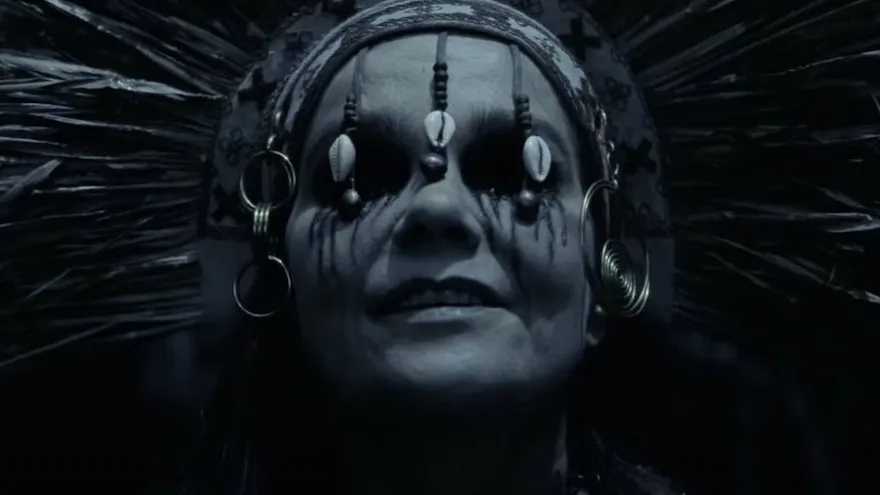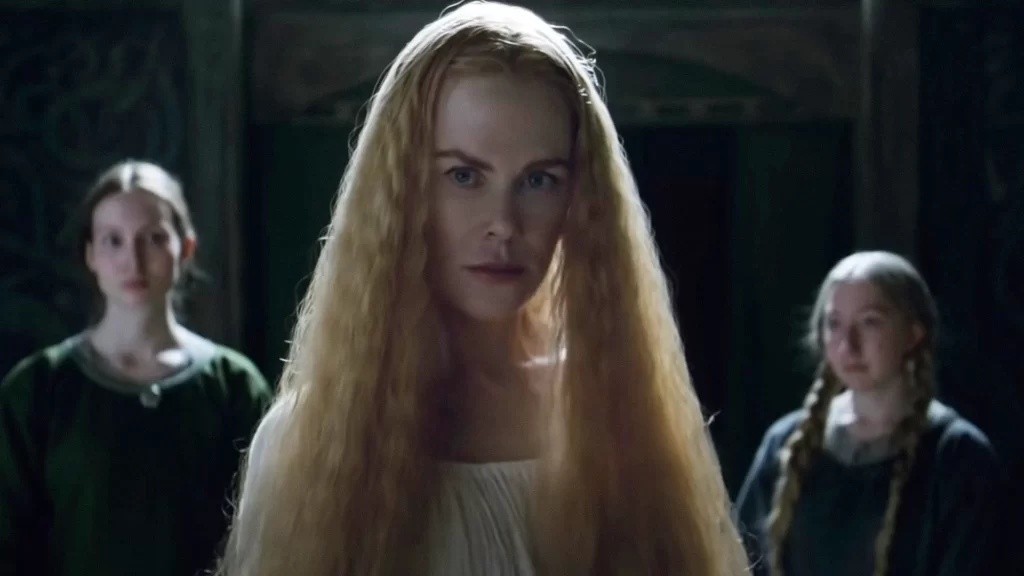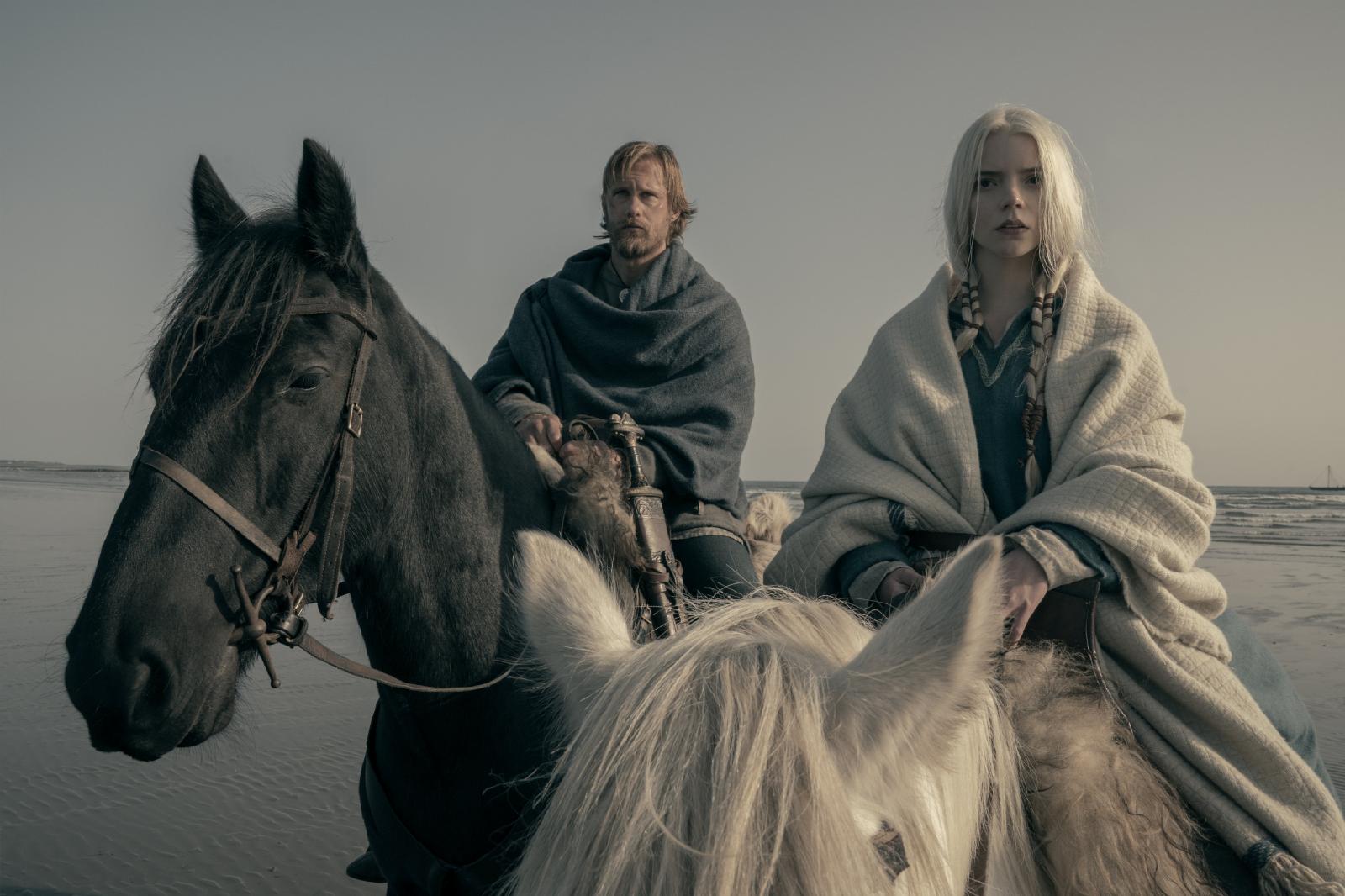The Ultra Violent Northman Movie’s Deep Mindjobness Explained. Like violent revenge movies? What about Norse enthused craziness? Or how about enormous A-name actors? Shakespearean themes? Oedipus complexes? Seeresses? Male witches? Prophesies? Oh, and mud, blood, and blood oaths? Still yes? Then boy, do I have a movie for you! Ever heard of a movie called Peewee’s Big Adventure? Just kidding. The Northman! I just walked out of the theater, and I’m still scratching my head at what happened. Maybe we can talk it through together and see if we can make heads or tales out of it.
Let’s see if we can count every single ab in this movie… shall we…
Nope. I quit. Too many.
The Northman Movie Walkthrough
The movie opens in 895. Not on the beltway 895… the year… you know, like Anno Domini, and all that? 895 years since the birth of Christ? (Personally, I think the Julian calendar is off three years, but we can discuss that ultra-micro-detail at another… DATE. HAHA.) Cough. So, in the year, 895, King Aurvandill (played by Ethan Hawke) returns to his kingdom. (Which, is interesting, seeing as though Ethan Hawke played Hamlet back at the turn of the Millennium… and The Northman is the original story that Shakespeare used as the germ of the idea.The story is literally based on Saxo Grammaticus’ Prince Amleth from the 12th century. So, technically, Ethan Hawke has played both his son, and the father… Man, I loved that version of Hamlet so much. So much in fact – I think I am going to go watch it right now! Come on, that scene of Hamlet in a BLOCKBUSTER, quoting, ‘To be, or not to be?’ Legend. Interested in joining me… you can find his Hamlet right here…)
Where the heck was I?
Oh, right. Aurvandill comes back to his kingdom with a lethal injury. His wife, Queen Gudrún (Nicole Kidman) and his son, the heir, Prince Amleth greet him. But because the king is intent on guiding his son through a ritual to prepare him for becoming King one day… they undergo a really hardcore dream/nightmare sequence… something straight out of Midsommar . And the next morning, masked men, sent by Aurvandill’s brother, Fjölnir (see? Hamlet), come and kill the king:
Fjölnir: “You behold your brother’s gaze in amazement. I knew well you would. Pity you never paid a bastard’s eyes head before. Now, behold how swiftly your brother swings his sword.”
Aurvandill: “Strike, Brother. Strike. But know that bearing a stolen ring makes no half-breed a king. Soaked in my blood, which will soon be sliding off arm like a serpent. Your kingdom will not last. Let this misdeed haunt your living nights til a flaming vengeance scorches on your death. STRIKE. STRIKE!”
Great scene.
Now, cut to the prince (ex-prince?) Amleth… who witnesses his father’s beheading, his village decimated (but that means a tenth are destroyed! Gah. Go away.), his mother carted away screaming, as he flees by boat. And as he leaves, he vows his father’s vengeance. And he also promises to save his mother as well. But to do that? He’s going to need some serious abs. So, to manage that, Amleth is found by a group of Vikings… who raise the still young child, and bring them up as a Berserker. Cut to, years later. When the raiding Berserkers pillage a village, and Amleth meets a seeress in the temple of Svetovit who bids him to remember his oath. To remember his uncle. To remember the death of his King father. This prophetess prophesies that this prince will soon bring judgment against his half uncle, Fjölnir. Awakened by the seeress, Amleth boards a slave ship in order to head to Iceland. ICELAND? Why? Well, because Amleth also learns that Fjölnir has been overthrown by Harald of Norway, and he now lives in exile there with Amleth’s mother. It turns out, that the slaves on board this ship are all being delivered to Fjölnir’s farm. I mean. CONVENIENT? Wow. Anyway. While traveling, Amleth also learns that his mother has born a child for Fjölnir, Gunnar, and now? Now it’s really messy.
Taken as slave on Fjölnir’s estate – one night, Amleth, goes and meets with a warlock in order to arrange a conversation between himself and Heimir. (“And there he is, standing there like HAMLET’S FATHER” – Come on! Another amazing movie. So hilariously funny. I am seriously hooking you up today:

Anyway – Heimir – the jester (played by Willem Dafoe), reveals that he also had been murdered by Fjölnir, and the jester proceeds to tell the prince of a magical sword that is only able to be drawn after sunset. Amleth, obviously, MacGuffins his way to the sword and fights an undead spirit in order to take the blade as his own. Back on the estate, Amleth is chosen in order to compete in a round of knattleikr. But when the game grows violent, Amleth saves Gunnar, and ingratiates himself in the process. Thorir, Fjölnir’s adult son (different wife) gives Amleth, Olga (Anya Taylor-Joy – who was made mainstream famous in The Queen’s Gambit, but who we have been following since long before. Morgan, Last Night in Soho, Thoroughbreds, Peaky Blinders, etc., etc.) as his wife. (Olga being the seeress on the slave ship that informed Amleth of his mother’s treachery… right? Keep up gang.) On their wedding bed, Olga swears that she will work with Amleth in order to bring revenge to Fjölnir and all his men.
Now… s@#$ is about to get crazy. Over the next few nights, Amleth begins killing Fjölnir’s men – and Olga, mixing mushrooms and psychedelics, creates a powerful potion that allows Amleth to enter the Lord’s home. There, he finally is reunited with his mother after all these years. And what does she do? She tries to seduce her son. BECAUSE OF COURSE SHE DOES. Then she tells her son that she was originally taken as a slave by his father… that Amleth’s birth was the result of rape, and that she actually prefers Aurvandill’s brother to Aurvandill. How do you like them apples? Yeah, that vengeance pact didn’t go quite the way that he hoped it would. Enraged (because wouldn’t you be?), Amleth leaves and kills Thorir the Proud, Fjölnir’s son. And even takes his heart as a punctuation mark.
Fjölnir, realizing that Amleth is responsible, takes Olga and threatens to kill her if he doesn’t come out. Trading his life for Olga’s, he gives up the heart. Amleth is then beaten only to have his restraints removed by a flock of ravens. Now… what happened right there? Some are conjecturing that it was Odin that released him. Or maybe it might be the spirit of the war-raven that released him. Regardless, he’s free, and Olga rescues him and the dynamic duo escape. Soon after, Amleth learns that Olga is pregnant with twins, and he also learns that one of them will become the Maiden King of the prophesies from the Seeress. (There are a lot of prophesies in this movie to keep track of, I get it.) Regardless, Amleth, worried that his twins will never be safe as long as his half uncle is alive, determines that he has to kill Fjölnir… so he jumps overboard. (I mean, when your wife doesn’t want you to do something… I posit that the drastic, and least realistic choice, is always the best approach.)
Cut back to the idyllic farm… Amleth lets all of Fjölnir’s slaves free and begins killing almost all of his men. Eventually Amleth is attacked by Gudrún – right? his mother… let that settle a moment. And then Gunnar… both of whom, I should add, he kills “accidentally.” He is here, avenging his father, and now he has killed his half brother, and mother. Finding the bodies of his sons, his men, and his wife, Fjölnir arranges to meet Amleth at the “Gates of Hell,” the volcano Hekla. They will resolve their conflict via holmgang, a ritualistic dual. During their challenge, Amleth is able to best Fjölnir by decapitating him. But Amleth is fatally injured. And as he lays dying, he has a vision of Olga embracing their twin children, and simultaneously, he begins ascending into Valhalla – as one does after killing 90% of a movie’s characters. And as he does, he sheds his first tear since his father’s death.

The Ultra Violent Northman Movie’s Deep Mindjobness Explained
That everyone (nearly) dies in the end shouldn’t have been a real surprise to you, the movie, the seed of this story, all of it is intimately connected to the story of Hamlet. And what happens in the story of Hamlet again? Oh, that’s right – everyone dies there too. Oh, and did I mention that The Northman was crafted and created by Robert Eggers? I didn’t? Huh. If you aren’t aware of Eggers, he created The VVitch, and also The Lighthouse. And if you learned anything from those two movies, you know that Eggers doesn’t ever do anything accidentally. Intentions, maybe dark intentions, but he’s always 100% intentional. There is a consistent through-line here from Hamlet to The Northman that Eggers has appropriated into his own telling and world. It’s a primal film, a film of mud, blood, and fire. You see these through-lines everywhere, including this surprising role for Nicole Kidman. Gudrún. Here? The reveal is that Hamlet was a child of rape, and his mother never loved his father. Wait, WHAT? Worse, Amleth (notice how if you remove the final letter, and… you get it.), in that fateful bedroom scene with his mother, notice how he attempts to secret her away – to save her. She tries to ease the truth to him, through a mother’s love. Then? When that isn’t working, she just starts napalm run after napalm run. Brutal honesty. “I see… you’ve inherited your father’s simpleness.” Hahaha. I just stared slack-jawed at that. This is a revenge movie. The formula is really simple: A slight is rendered. A vow is made. Revenge is enacted.
And the brilliance here is that while this story is the older tale… it is the more progressive telling of it. If you are a fan of Hamlet, as I am (it’s my favorite of Shakespeare’s plays, followed by Romeo and Juliet, then any of all the tragedies, then the rest.) you know that Hamlet’s mother, Gertrude, is totally let off the hook. If you don’t remember the story, there, it is unclear her intentions. I mean, you get a feeling that she is at the very least complicit. But is there more than a sin of omission going on here? Was it also a commission? I mean, personally, it seems obvious she is in on it all. But here, in the Northman – and this one? This one goes to eleven. Here, Gudrún nukes any sort of hint that maybe she would be innocent. Here she tells of her rape, basically derailing the entirety of his plan for revenge… the legitimacy of any of it. Right?
Just think about this for a second… start the story over in your mind. But go the beginning. Gudrún is a happy villager somewhere. Minding her own business. When, along comes King Aurvandill… a pillager hitting this village hard, similar to what we saw him doing at the beginning of the film. Here though, Aurvandill snags Gudrún for his own, and hauls her to his castle and takes her as his wife. He than has a baby Ethan Hawke, and internally, she holds this grudge her entire life. Then comes Aurvandill’s brother. So wait! Was that the original vengeance in this story? The story of vengeance begetting vengeance? I’m getting ahead of myself here. Was Fjölnir beguiled by Gudrún? Bedeviled and convince to avenger her rape and years of mothering in a bespoke slavery? Which then began an entirely new epoch of violence, blood and revenge? huh. Don’t mind me while I process this movie on the fly.
“Frailty! Thy name is woman!” Definitely spins that quote into entirely new directions.
And yet… we can also see her as the real evil in this movie. Sure, initially, she is the victim. Rape survivor. But she also she sees her husband as a powerful opportunity, one she can grab by giving him a son. Then, she accepts Fjölnir’s bed, even if it is incest, in order to hold on to power in one form or another. Now, consider this… her son arrives to save her. He comes with pure intentions. He comes with a white heart, if bloodied hands. (There is a moral here if you dig just a bit.) He begs her to flee with him. He will save her, set her up, take care of his mother, like a son should. But she knows power when she sees it. She knows opportunity when she sees it. Fjölnir is a dead man. This much is obvious. So what does she try to do? She attempts to seduce her own son! Yeah, there is a lens through which Gudrún is the vilest of the dark hearts in this movie.
Revenge’s Script is Flipped?
Which begs the question. Is Eggers larger intention here to flip the script on the boiler plate revenge flick… or better yet, the entire revenge storyline in all its various mediums? Is Eggers saying here… the original revenge plot-line, that of Hamlet – the seed… Amleth, was failed at the outset? Can you see what I’m saying here? Is the real insidiousness, the real darkness, that this story is unhinging/unmooring all previous revenge movies? John Wick? Unmoored. Die Hard? Untethered. First Blood? Unhinged? And it doesn’t take a real genius to see that here, even without the Gudrún storyline. It all is futile. King Aurvandill wanted only to die in battle. Why? For some lame “mythic” place in Valhalla? He calls out his son to vengeance, why? For some sense of useless and deeply flawed pride? At the end of the day – he dies, at his own brother’s hand. And Amleth? He dies, at his uncle’s hand. And Gudún? Dead. All of them dead as they search for some “eternal glory” in their combined stupidity. Sort of reminds me of the battles raging in Ukraine right now. Pillaging, destruction, rape… all for what? Pride?
Personally, I enjoy Eggers’ movie making style. I loved the slow burn of VVitch. I loved trying to untangle the dark perfidiousness of The Lighthouse. And I also enjoyed the soaked through darkness and blood of this movie. It all worked together to question a deeper meaning. Is there though, an argument to be made about a film that does a thing that it is inherently criticizing, isn’t it too worthy of being criticized by its own logic? Hrmmm.
Edited by: CY


